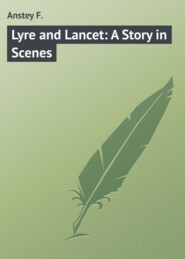По всем вопросам обращайтесь на: info@litportal.ru
(©) 2003-2024.
✖
The Giant's Robe
Настройки чтения
Размер шрифта
Высота строк
Поля
'Which is the reason we love him,' came in a stage aside from Cuthbert, who took advantage of a slight deafness in one of his uncle's ears.
'Well, Mr. Schoolmaster,' said the latter, working round to Mark again, 'and how are you gettin' on? If you'd worked harder at College and done me credit, you'd 'a' been a feller of your college, or a judge in an Indian court, by this time, instead of birching naughty little boys.'
'It's a detail,' said Mark; 'but I don't interfere in that department.'
'Well, you are young to be trusted with a birch. I'm glad they look at things that way. If you're satisfied with yourself, I suppose I ought to be, though I did look forward once to seeing a nephew of mine famous. You've 'ad all your fame at Cambridge, with your papers, and your poems, and your College skits – a nice snug little fame all to yourself.'
Martha tittered acidly at this light badinage, but it brought a pained look into Trixie's large brown eyes, who thought it was a shame that poor Mark should never be allowed to hear the last of his Cambridge fiasco.
Even Mrs. Ashburn seemed anxious to shield Mark. 'Ah, Solomon,' she said, 'Mark sees his folly now; he knows how wrong he was to spend his time in idle scribbling to amuse thoughtless young men, when he ought to have studied hard and shown his gratitude to you for all you have done for him.'
'Well, I've been a good friend to him, Jane, and I could have been a better if he'd proved deserving. I'm not one to grudge any expense. And if I thought, even now, that he'd really given up his scribbling – '
Mark thought it prudent to equivocate: 'Even if I wished to write, uncle,' he said, 'what with my school-work, and what with reading for the Bar, I should not have much time for it; but mother is right, I do see my folly now.'
This pleased Uncle Solomon, who still clung to the fragments of his belief in Mark's ability, and had been gratified upon his joining one of the Inns of Court by the prospect of having a nephew who at least would have the title of barrister; he relaxed at once: 'Well, well, let bygones be bygones, you may be a credit to me yet. And now I think of it, come down and stay Sunday at "The Woodbines" soon, will you? it'll be a rest for you, and I want you to see some of that 'Umpage's goings on at the church.' (Uncle Solomon not unfrequently dropped an 'h,' but with a deliberation that seemed to say that he was quite aware it was there, but did not consider it advisable to recognise it just then.) 'He's quite got round the Vicar; made him have flowers and a great brass cross and candles on the Communion table, and 'Umpage all the time a feller with no more religion inside him than' – here he looked round the table for a comparison – 'ah, than that jug has! He's talked the Vicar into getting them little bags for collections now, all because he was jealous at the clerk's putting the plate inside my pew reg'lar for me to hold. It isn't that I care about 'olding a plate, but to see 'Umpage smirking round with one of them red velvet bags makes me downright sick – they'll drive me to go over and be a Baptist one of these fine days.'
'You don't like Mr. Humpage, do you, uncle?' said Trixie.
''Umpage and me are not friendly – though contiguous,' said he; 'but as for liking, I neither like nor dislike the man; we 'old no intercourse, beyond looking the other way in church and 'aving words across the fence when his fowls break through into my garden – he won't have the hole seen to, so I shall get it done myself and send the bill in to him – that's what I shall do. – A letter for you, Matthew? read away, don't mind me,' for the maid had come in meanwhile with a letter, which Matthew Ashburn opened and began to read at this permission.
Presently he rubbed his forehead perplexedly: 'I can't make head or tail of it,' he said feebly; 'I don't know who they are, or what they write all this to me for!'
''And it over to me, Matthew; let's see if I can make it any plainer for you,' said his brother-in-law, persuaded that to his powerful mind few things could long remain a mystery.
He took the letter, solemnly settled his double eyeglasses well down on his broad nose, coughed importantly, and began to read: 'Dear Sir,' he began in a tone of expounding wisdom – 'well, that's straightforward enough – Dear Sir, we have given our best consideration to the – hey!' (here his face began to grow less confident) 'the sweet – what? – ah, sweet bells, sweet bells jangled. What have you been jangling your bells about, eh, Matthew?'
'I think they're mad,' said poor Mr. Ashburn; 'the bells in this house are all right, I think, my dear?'
'I'm not aware that any of them are out of order; they rehung the bell in the area the other day – it's some mistake,' said Mrs. Ashburn.
'Which,' continued Uncle Solomon, 'you 'ave been good enough to submit to us (pretty good that for a bell-'anger, hey?) We regret, however, to say that we do not find ourselves in a position to make any overtures to you in the matter. Well,' he said, though not very confidently, 'you've been writing to your landlord about the fixtures, and these are his lawyers writing back – isn't that it now?'
'What should I write to him for?' said Mr. Ashburn; 'that's not it, Solomon – go on, it gets worse by-and-by!'
'Your one fair daughter also (hullo, Trixie!) we find ourselves compelled to decline, although with more reluctance; but, in spite of some considerable merits, there is a slight roughness (why, her complexion's clear enough!), together with a certain immaturity and total lack of form and motive (you are giddy, you know, Trixie, I always told you so), which are in our opinion sufficient to prevent us from making any proposals to you in the matter.'
Uncle Solomon laid down the letter at this point, and looked around open-mouthed: 'I thought I could make out most things,' he said; 'but this is rather beyond me, I must say.'
''Ere are these people – what's their names? Leadbitter and Gandy (who I take it are in the gas-fitting and decorating line) – writing to say in the same breath that they can't come and see to your bells, and they don't want to marry your daughter. Who asked them? – you ain't come down so low in the world to go and offer Trixie to a gas-fitter, I should 'ope, Matthew! – and yet what else does it mean – tell me that, and I'll thank you.'
'Don't ask me,' said the unhappy father; 'they're perfect strangers.'
'Trixie, you know nothing about it, I hope?' said Mrs. Ashburn, rather suspiciously.
'No, ma dear,' said Trixie; 'but I don't want to marry either Mr. Leadbitter or Mr. Gandy.'
The situation had become too much for Mark; at first he had hoped that by holding his tongue he might escape being detected, while the rejection of both the novels from which he had hoped so much was a heavy blow which he felt he could scarcely bear in public; but they seemed so determined to sift the matter to the end that he decided to enlighten them at once, since it must be only a question of time.
But his voice was choked and his face crimson as he said, 'I think perhaps I can explain it.'
'You!' they all cried, while Uncle Solomon added something about 'young men having grown cleverer since his young days.'
'Yes, that letter is addressed to me – M. Ashburn, you see, stands for Mark, not Matthew. It's from – from a firm of publishers,' said the unlucky Mark, speaking very hoarsely; 'I sent them two novels of mine – one was called "One Fair Daughter," and the other "Sweet Bells Jangled" – and they, they won't take them – that's all.'
There was a 'sensation,' as reporters say, at this announcement: Martha gave a sour little laugh of disgust; Cuthbert looked as if he thought a good deal which brotherly feeling forbade him to put in words; but Trixie tried to take Mark's hand under the table – he shrank from all sympathy, however, at such a moment, and shook her off impatiently, and all she could do was to keep her eyes in pity from his face.
Mrs. Ashburn gave a tragic groan and shook her head: to her a young man who was capable of writing novels was lost; she had a wholesome horror of all fiction, having come from a race of Dissenters of the strict old-fashioned class, whose prejudices her hard dull nature had retained in all their strength. Her husband, without any very clear views of his own, thought as she did as soon as he knew her opinions, and they all left it to Mr. Lightowler to interpret the 'evident sense of the house.'
He expanded himself imposingly, calling up his bitterest powers of satire to do justice to the occasion: 'So that's all, is it?' he said; 'ah, and quite enough, too, I should think; so it was the bells on your cap that were jingling all the time?'
'Since you put it in that pleasant way,' said Mark, 'I suppose it was.'
'And that's how you've been studying for the Bar of evenings, this is the way you've overcome your fondness for scribbling nonsense? I've spent all the money I've laid out on you' (it was a way of his to talk as if Mark had been a building estate), 'I've given you a good education, all to 'ave you writing novels and get 'em "returned with thanks!" – you might have done that much without going to College!'
'Every writer of any note has had novels declined at some time,' said Mark.
'Well,' said Uncle Solomon, ponderously, 'if that's all, you've made a capital start. You can set up as a big littery pot at once, you can, with a brace of 'em. I 'ope you're satisfied with all this, Jane, I'm sure?'
'It's no use saying anything,' she said; 'but it's a bad return after all your kindness to him.'
'A return with thanks,' put in Cuthbert, who was not without some enjoyment of Mark's discomfiture; he had long had a certain contempt for his elder brother as a much overrated man, and he felt, with perfect justice, that had Fortune made him his uncle's favourite, he had brains which would have enabled him to succeed where Mark had failed; but he had been obliged to leave school early for a City office, which had gone some way towards souring him.
'There's an old Latin proverb,' said Mr. Ashburn, with a feeling that it was his turn – 'an old Latin proverb, "Nec suetonius ultra crepitam."'
'No, excuse me, you 'aven't quite got it, Matthew,' said his brother-in-law, patronisingly; 'you're very near it, though. It runs, if I don't make a mistake, "Ne plus ultra sutorius (not suetonius—he was a Roman emperor) – crepitam," a favourite remark of the poet Cicero – "Cobbler stick to your last," as we have it more neatly. But your father's right on the main point, Mark. I don't say you need stick to the schoolmastering, unless you choose. I'll see you started at the Bar; I came this very evening to 'ave a talk with you on that. But what do you want to go and lower yourself by literature for? There's a littery man down at our place, a poor feller that writes for the "Chigbourne and Lamford Gazette," and gets my gardener to let him take the measure of my gooseberries; he's got a hat on him my scarecrow wouldn't be seen in. That's what you'll come to!'
'There's some difference,' said Mark, getting roused, 'between the reporter of a country paper and a novelist.'
'There's a difference between you and him,' retorted his uncle; 'he gets what he writes put in and paid so much a line for —you don't. That's all the difference I can see.'
'But when the books are accepted, they will be paid for,' said Mark, 'and well paid for too.'
'I always thought that dog and the shadow must ha' been a puppy, and now I know it,' said his uncle, irritably. 'Now look here, Mark, let's have no more nonsense about it. I said I came here to have a little talk with you, and though things are not what I expected, 'ave it I will. When I saw you last, I thought you were trying to raise yourself by your own efforts and studying law, and I said to myself, "I'll give him another chance." It seems now that was all talk; but I'll give you the chance for all that. If you like to take it, well and good; if not, I've done with you this time once for all. You go on and work 'ard at this Law till you've served your time out, or kept your terms, or whatever they call it, and when you get called you can give 'em notice to quit at your school. I'll pay your fees and see you started in chambers till you're able to run alone. Only, and mind this, no more of your scribbling – drop that littery rubbish once for all, and I stand by you; go on at it, and I leave you to go to the dogs your own way. That's my offer, and I mean it.'
There are few things so unpleasantly corrective to one's self-esteem as a letter of rejection such as had come to Mark – the refusal of the school committee was insignificant in comparison; only those who have yielded to the subtle temptation to submit manuscript to an editor or a publisher's reader, and have seen it return in dishonour, can quite realise the dull anguish of it, the wild, impotent rebellion that follows, and the stunned sense that all one's ideas will have somehow to be readjusted; perhaps an artist whose pictures are not hung feels something of it, but there one's wounded vanity can more easily find salves.
Mark felt the blow very keenly; for weeks he had been building hopes on these unfortunate manuscripts of his; he had sent both to a firm under whose auspices he was particularly anxious to come before the world, in the hope that one at least would find favour with them, and now the two had been unequivocally declined; for a moment his confidence in himself was shaken, and he almost accepted the verdict.
And yet he hesitated still: the publisher might be wrong; he had heard of books riding out several such storms and sailing in triumphantly at last. There was Carlyle, there was Charlotte Brontë, and other instances occurred to him. And he longed for speedy fame, and the law was a long avenue to it.
'You hear what your uncle says?' said his mother. 'Surely you won't refuse a chance like this.'
'Yes, he will,' said Martha. 'Mark would rather write novels than work, wouldn't you, Mark? It must be so amusing to write things which will never be read, I'm sure.'
'Leave Mark alone, Martha,' said Trixie. 'It's a shame – it is.'
'I don't know why you should all be down on me like this,' said Mark; 'there's nothing positively immoral in writing books – at least when it never goes any further. But I daresay you're right, and I believe you mean to be kind at any rate, uncle. I'll take your offer. I'll read steadily, and get called, and see if I'm good for anything at the Bar, since it seems I'm good for nothing else.'











